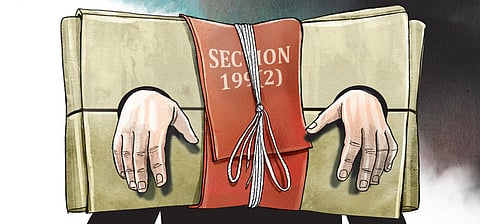The state should listen to its critics
The Madras High Court, in a recent verdict, exonerated a group of journalists of the charges of defamation over certain reports including those against the then chief minister of Tamil Nadu. Justice Abdul Quddhose said that “a public servant or a constitutional functionary must be able to face criticism” and that “the state cannot use criminal defamation cases to throttle democracy”.
Section 199(2) of the Criminal Procedure Code (Cr.PC) is a curious law. It enables the state and its functionaries to utilise the office of the public prosecutor to move a written complaint to the Court of Session and to prosecute people, claiming that the President, the Governor or a minister is defamed. Previous sanction of the government is essential for such complaints.
The phrase “defamation of a public functionary” is, to some extent, ironical. The text of the provisions needs deconstruction for a proper understanding of the offence. Section 499 of the Indian Penal Code (IPC) deals with the offence of defamation and it is the same offence that is referred to in Section 199 of the Cr.PC. The second exception to the IPC provision says that expression of an opinion, in good faith, concerning the conduct of a public servant in the discharge of public functions, or his character is not defamation. With this exception, the need to incorporate it in the Cr.PC and to arm the state with government machineries is indeed questionable. In cases of personal defamation, the concerned public functionary can move court personally without the aid of Section 199(2). This is clear from Section 199(6) of the Code. A public functionary is generally criticised for their public activities, which when done in good faith, is not defamation.
In Subramanian Swamy’s case (2016), the SC refused to strike down the provisions relating to criminal defamation, which in turn kept Section 199 also alive. However, Indian experience shows that Section 199 has been abused by the political executive of all colours from time to time to suppress dissent and stifle criticism. It is also pre-censorship in disguise. It has a chilling effect on whistleblowers.
The argument that defamation as such should cease to be a criminal offence does not appear to be correct. As such, Sections 499 to 502 of the IPC have their own rationale and purpose. A private action for defamation by invoking penal provisions has justification insofar as it seeks to protect the individuals who are entitled to preserve their reputation. But the problem with Section 199 is it conceives public functionaries under the state as ‘defamable’ and motivates them to repress the dissidents with the instrumentalities of the very same state. Thus, every use of the law becomes a misuse, for it lacks democratic legitimacy.
The High Court’s admonition is a great stimulus package to the free speech jurisprudence that badly needed it during the time of the pandemic. The verdict has lessons to offer for democracies across the globe during and after the pandemic. Studies indicate that more than hundred regimes in the world declared a state of emergency in one way or another after the spread of Covid-19. Free speech faces newer threats during the time of pandemic. The United Nations High Commissioner for Human Rights, Michelle Bachelet, openly warned against the dispensations worldwide from becoming illiberal and abusing the emergency power on the ground of medical exigencies.
The recent verdict also alerts the judiciary in India at a time when its top court is critiqued widely for almost going back to the infamous ADM Jabalpur moment. It was in ADM Jabalpur (1976) that the Supreme Court, by majority, held that the fundamental rights could be suspended during emergency, at the will of the political executive. On issues ranging from internet rights to the plight of the migrant workers, the top court had remained insensitive during the most precarious times.
In India, free speech faces several challenges. Even an innocent tweet, comment or speech is taken as the basis for booking people in different states irrespective of the party in power. Political leaders, public activists, journalists, students, writers and cartoonists are targeted. The politics based on such First Information Reports is essentially undemocratic. In many such cases, instead of Section 199 of the Cr.PC, the political governments use other devices in the IPC. There are outdated laws dealing with sedition (Section 124 A) or blasphemy (Section 295 A) that are misused. The nation needs a liberal reformative agenda to do away with such obsolete and dangerous remnants of the colonial regime.
Potential for misuse is not a legal ground to strike down the law (Shreya Singhal, 2015).Therefore, it is vital to ensure that freedom of speech is not unreasonably curtailed even during a state of emergency—financial, political or health. The European Court of Human Rights has laid down the correct proposition: “Freedom of expression ... is applicable not only to ‘information’ or ‘ideas’ that are favourably received or regarded as inoffensive or as a matter of indifference, but also to those that offend, shock or disturb the State or any sector of the population” (Handyside v. United Kingdom,1976).
Kaleeswaram Raj
Lawyer, Supreme Court of India
(kaleeswaramraj@gmail.com)

